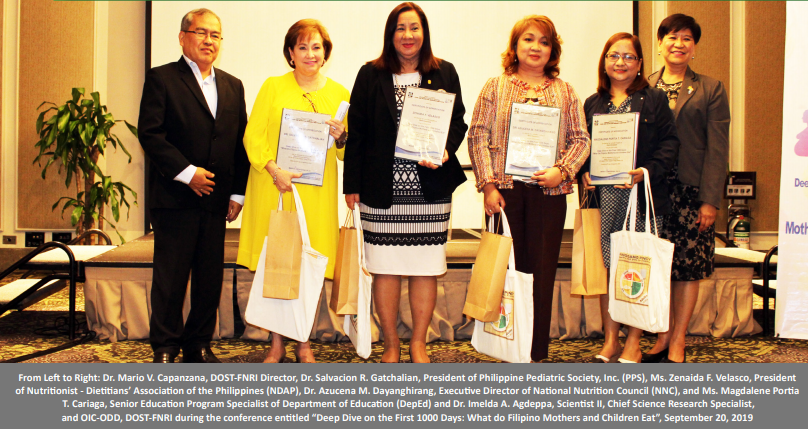The Department of Science and Technology-Food and Nutrition Research Institute (DOST-FNRI) disseminated the results of the Feeding Infant and Toddler Studies (FITS) during the conference entitled “Deep Dive on the First 1000 Days: What Do Filipino Mothers and Children Eat” on September 20, 2019, Makati Diamond Residences. A total of 32 participants from various health and nutrition sectors attended the event.
Senator Francis N. Tolentino, Chairman of the Senate Committee on Local Government and Urban Planning, Housing, and Resettlement, graced the event with his special message and noted that the government should move forward for the best interest of a child and look for pathways that would give a child proper nutrition.
Dr. Mario V. Capanzana, DOST-FNRI Director, then provided an overview on FITS. This is an analysis of the 2013 National Nutrition Survey conducted by the DOST-FNRI in collaboration with Nestle Research Center. The studies focused on food and nutrient intakes of infants and young children. Results were discussed by the Project Leader Dr. Imelda Angeles-Agdeppa, Chief Science Research Specialist, Scientist II and OIC, Office of the Deputy Director. In her report, she reported that infants aged 6-11 months had inadequate intakes of iron, vitamin A, vitamin B1 , vitamin B2 , vitamin B3 , and zinc whereas toddlers aged 12-23 months had diets lacking in calcium, iron, vitamin C, vitamin A, vitamin B1 , vitamin B2 , vitamin B6 , vitamin B12, and folate. Moreover, those residing in rural areas had higher prevalence of nutrient inadequacy than those living in urban areas.
Nutrient intakes of pregnant and lactating women were also discussed. Results showed that both pregnant and lactating women were highly inadequate in thiamin, riboflavin, folate, calcium, vitamin C, and iron.
Part of the program is a panel discussion where discussants from various sectors in the field of health and nutrition converged and talked about their existing programs and projects in alleviating malnutrition particularly during the first 1000 days. The discussion was moderated by Dr. Eva A. Goyena, DOST-FNRI, Senior Science Research Specialist, who asked the following questions: (1) What practical actions, policies, programs and guidelines can be done by your respective agencies or organizations to help improve the dietary profile of Filipino mothers and children; (2) How do we ensure that the general public cooperate with the these planned actions for the improvement of nutrition and dietary status of Filipino mothers and children; and (3) How do we strengthen Public-Private Partnerships in this endeavor? Panelists included Ms. Zenaida F. Velasco, DOST-FNRI President of Nutritionists-Dietitians’ Association of the Philippines, Dr. Salvacion R. Gatchalian, President of Philippine Pediatric Society, Inc., Ms. Magdalene Portia T. Cariaga, Senior Education Program Specialist of Department of Education, and Dr. Azucena M. Dayanghirang, Executive Director of National Nutrition Council. The discussion ended with a call to action to communicate and coordinate between and among various stakeholders in addressing health and nutritional problems of newborns, infants and young children, pregnant and lactating women.
The results of FITS strengthen the importance of the first 1000 days of a child when the foundations of optimum health, growth, and neurodevelopment across the lifespan are established. Furthermore, the results may serve as guide in formulating meaningful and strategic policies and programs for the proper implementation of RA 11148 or the “Kalusugan at Nutrisyon ng Magnanay Act”.












